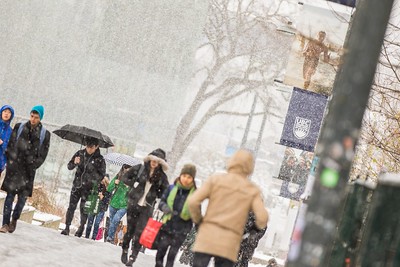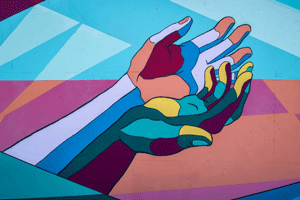Why did we create this newsletter? Read more here. Trainee Thrive will be your one-stop-shop for all things wellbeing, with a specific focus on research trainees in Medicine. We hope you’ll subscribe! You can unsubscribe at any time.
Spring and snow are in the air; February contains multitudes!
For one thing, it’s Valentine’s Day – a polarizing holiday, but one that can remind us to show ourselves a little tenderness. Check out the Wellbeing Feature below on self-compassion.
Next, February is Psychology Month. COVID-19 has obviously brought new and complex challenges, and psychological researchers and clinicians have stepped up to help. Clinical psychologist and UBC Department of Psychiatry professor Steven Taylor has become a go-to expert for helping the public understand the pandemic’s mental health impacts. Other researchers are investigating pandemic experiences through a positive psychology lens – finding, for instance, that many people began to recover their sense of autonomy and agency soon after the crisis began, even as stress levels remained high. The BC Psychological Association is hosting a series of webinars throughout February, including “The Overwhelmed Parent: Mindfulness to the Rescue” (February 11), “Work-Life Harmony in the Era of COVID-19” (February 17), “Overcoming Imposter Syndrome” (February 19), and many more.
February is also Black History Month, an opportunity to celebrate Black history and excellence – including in the achievements of Black graduate students in the Faculty of Medicine such as Marian Orhierhor (School of Population & Public Health), Dwayne Tucker (Reproductive & Developmental Sciences), Priye Iworima (School of Biomedical Engineering), Juma Orach (Experimental Medicine), and Marie Paul Nisingizwe (School of Population & Public Health). Check out UBC’s Black History Month events.
As if that wasn’t enough, this month brings us Move UBC – an annual campaign to boost physical activity. It’s never been more important to get moving in ways that feel good and energize us, so check out ideas, resources, and events here to help you “Move More, Move Well, Move Anywhere”!
Finally, sending best wishes to all students, postdocs, and their families celebrating the Lunar New Year and the start of the Year of the Ox. Happy New Year!

Resource Spotlight: Counselling Options @ UBC
In the spirit of Psychology Month, I wanted to address some questions I commonly hear about mental health and counselling resources at UBC. For grad students, I’ll focus on three options: UBC Counselling Services, the UBC Student Assistance Plan (SAP), and extended health benefits (Studentcare/Pacific Blue Cross). For postdocs, two key resources are the Employee & Family Assistance Program (EFAP) and extended health benefits (Sun Life). Please note that this information is based on my current understanding and may be subject to change. Up-to-date information can be found at students.ubc.ca/health (for grad students) or UBC HR (for postdocs).
For grad students:
What’s the difference between Counselling Services and UBC Student Assistance Plan (SAP)?
Both of these services can offer individual, confidential counselling with a trained & credentialed professional (such as a Registered Clinical Counsellor, Registered Psychologist, Registered Social Worker, etc.). Both use a goal-directed, short-term counselling model, which typically means around 3 sessions per “issue” (although this can vary). If longer-term or more specialized help is needed, the counsellor will work with students to try to find options. Counselling Services and UBC SAP both offer the option of same-day “single-session” counselling, a targeted approach that leverages a student’s goals, strengths, and resources to offer meaningful help within a single conversation.
During non-COVID times, UBC Counselling Services is physically located on Point Grey campus (plus one afternoon a week at the Oak Street Campus). UBC Counselling Services is fully run by UBC (its counsellors are UBC employees), whereas UBC SAP is contracted from an external provider (Aspiria). UBC SAP/Aspiria has counsellors available 24/7 for immediate support as well as a broad network of community-based counsellors to whom they refer students.
At the moment, students must be residing in BC to access UBC Counselling Services, whereas students can access UBC SAP from anywhere in the world. And while UBC Counselling Services focuses on counselling (individual or group), UBC SAP additionally offers life coaching, nutrition counselling, and financial advice. UBC SAP can provide services in a variety of languages.
When it comes to seeking support, in this case, any door is the right door. Many students access both, over the course of their time at UBC. Having worked at on-campus counselling centres and services similar to UBC SAP, I can attest that both settings employ wonderful, skillful, caring counsellors. (That said, client-counsellor “fit” can make a big difference – so if a counsellor at one service doesn’t feel like the right fit, you could try the other service).
Hours & phone number for UBC Counselling Services can be found here. A “Wellness Advising” appointment is the first step to accessing counselling as well as other useful resources.
Contact info for UBC SAP can be found here. You can either request immediate counselling support or book an appointment for later.
You also have the option of using extended health benefits to access a counsellor in the community (i.e., “private practice”). Students enrolled in Studentcare have $1000 per academic year (September-August) to cover sessions with a psychologist, Registered Clinical Counsellor, or social worker. Some people like this option because it allows more freedom to decide which therapist to see. For more information, check out this post from the Wellbeing blog.
For postdocs:
Many postdocs are eligible to access the UBC Employee & Family Assistance Program (EFAP). The EFAP works similarly to the UBC SAP, in that it’s an external provider (Morneau Shepell) contracted to deliver confidential, short-term clinical counselling as well as financial and legal support, parenting support, career counselling, and nutrition support. Services are available in multiple languages to eligible employees plus their family members.
Many postdocs also have extended health benefits through UBC (Sun Life). In some plans, this includes up to $2500 for the services of psychologists, Registered Clinical Counsellors, or social workers (see my blog post about using extended health benefits for counselling). If you have questions about your benefits eligibility or your enrollment, please contact your department administrator.
These benefits are here for you to use, even if you aren’t in crisis or acute distress. We use our dental benefits for regular check-ups, and our massage benefits for “everyday” tweaks and pains; why not use our mental health benefits in the same way?

Resource Highlights
Ongoing: UBC Graduate Student Online Support, Thursdays, 1:30–2:45pm PT
Connect with a small group of fellow grad students to discuss what’s on your mind, give and receive support, and build resilience for pandemic times and beyond. Drop in once or join every week – it’s up to you. The group leader, Dr. Karen Flood, has lots of experience working with Faculty of Medicine grad students; she’s been the counsellor situated at the Women’s & Children’s hospital site for the past several years. Sign up here. Participants must be currently residing in BC.
Graduate Student Wellbeing Ambassadors
Graduate Student Wellbeing Ambassadors (GSWAs) advocate for wellbeing in their labs, programs, and institutes by helping fellow grad students understand and navigate wellness services and resources. We have a small but stellar group of GSWAs in the Faculty of Medicine, who have been introducing themselves within their programs. Next year we’re hoping to have GSWAs in each program and each building/centre. If you might be interested, watch this newsletter for an announcement in the Spring/Summer or reach out to Diana Jung for more information (see this link).
For postdocs: Adaptive Resilience Training
Adaptive resilience is the ability to recover from adversity, adapt, and thrive. It builds the capacity to be productive, resourceful, and creative while dealing with changing circumstances or adversity. This 3-part series teaches new ways to build the behaviors, mental habits, and practices that promote personal resilience and equip you to support others. Limited spots remaining; find information here.

Wellbeing Feature
Self-compassion, AKA being a little nicer to ourselves
Do you ever hold yourself to expectations that are not only high, but unfair and unkind? Does the voice inside your head sometimes turn nasty, criticizing you harshly when things don’t go exactly to plan?
We’re all human and thus imperfect, but sometimes our minds don’t get that memo. It can take practice to “flip the switch” to a mode of self-compassion – that is, showing yourself the same kindness and care that you would extend to a good friend. This month on the Wellbeing blog, I reflect on self-compassion.
Register now for a Wellbeing Convene webinar on Self-Compassion, led by Dr. Farah Shroff and hosted by me, Dr. Karen Ross. Wednesday March 3, 8:00-9:00am; open to all in the Faculty of Medicine.

Quick Tips
“Wellness is an intentional life practice that supports resiliency, growth, and sustained health. Wellness is also a buzz word, and yet another thing we’re asked to do better.” –Kion Davies, Registered Clinical Counsellor
Wellness can represent a paradox. We all want to be happy & healthy, but can also feel overwhelmed by the constant stream of workshops, articles, & exercises that offer to help us “do wellness better” (including some in this newsletter!). We can even start feeling guilty or ashamed, like we’re “failing” at wellness because we don’t have the capacity to attend lunchtime Zoom yoga or start a gratitude journal (on top of research/coursework/parenting/life duties).
If all you can do right now is get by, that’s enough.
Trust your intuition. Maybe wellness, for you, currently means focusing on the little things – drinking water, getting outside most days. Or maybe it means paying attention to what feels good, giving yourself enjoyment – watching Netflix, treating yourself to candy or chips, having a mid-day nap. Everyone’s priorities and capacities are different, especially during an extended pandemic. There are times to push yourself and times to pamper yourself, times to strive and times to conserve your energy. Take care of yourself however you can, and let yourself off the hook for “extras” that aren’t possible right now.

Upcoming Events
Move UBC is hosting a ton of events throughout February, from online workouts & yoga, to drop-in figure skating and a socially distanced “wellbeing walk,” to a virtual Pow Wow dance lesson. Go to move.ubc.ca and check out the Event Calendar for updates.
Caring for Yourself in Grad School (Thursday February 11, 11am-12:30pm): This interactive workshop and discussion focuses on caring for yourself during graduate school, including coping with stressors and creating a proactive action plan. Facilitated by members of UBC Counselling Services and the Health and Promotion Education Unit. Part of the Graduate Wellness Group Discussion Series. Register here. [Audience: Grad students]
How to Find a Job You’ll Love (Friday February 12, 9-10am): Join L. Maren Wood, PhD, founder of Beyond the Professoriate, in this webinar and learn how you can find a non-academic career where you will thrive, engage in meaningful work, and be connected to people and projects that matter to you. Info here. [Audience: PhD students & postdocs considering non-academic careers]
Laughter Yoga (Thursday February 18, 8-9am): Laughter is a joyful form of health promotion and disease prevention. Laughter yoga combines breath, gentle movement, and laughter for a full belly workout that uplifts. Join Dr. Farah Shroff for this participatory webinar, part of the Wellbeing Convene series. Register here. [Audience: UBC Faculty of Medicine]
Blooming Intentions (Thursday February 18, 12-1pm): Blooming Intentions is a “Pop-Up” Mindfulness & Art class, part of the Intentional WellBEing series. Explore your intentions for 2021 through Mindfulness and creativity, making them come alive through color and paint. Info here. [Audience: UBC Faculty of Medicine]
GSS Flow Yoga and GSS Latin Funk: In collaboration with UBC Ahtletics and Recreation, the Graduate Student Society is offering two 10-week evening classes: choose either flow yoga or Latin funk, or try them both! All levels welcome. $10 (plus Eventbrite fee) for the entire series. Info & registration here. [Audience: Grad students]
Mindfulness and Social Justice: Mindfulness Based Anti Racism (Tuesday February 23, 9:30-11am): This experiential workshop will explore mindfulness-based strategies to foster engaged discussion related to difficult topics (such as systemic racism and violence) while being mindful of the impact those topics/discussions might have on oneself and others. Register here. [Audience: Postdocs]
Wellness and Leadership (Thursday February 25, 12-1pm): With Dr. Linlea Armstrong. Part of the Wellbeing Convene series. Register here. [Audience: UBC Faculty of Medicine]
Self-Compassion (Wednesday March 3, 8-9am): With Dr. Farah Shroff. Part of the Wellbeing Convene series. Register here. [Audience: UBC Faculty of Medicine]

Wellbeing News & Views
From our friends over at the Resident Wellness Office – Resident Wellness Coordinator Aileen McKeown writes about persistence in the face of self-doubt, drawn from her experience as a trail runner.
And my favourite thing from the Internet yesterday: “A lawyer using Zoom had to let a judge know that he wasn’t a cat after inadvertently activating a face filter”